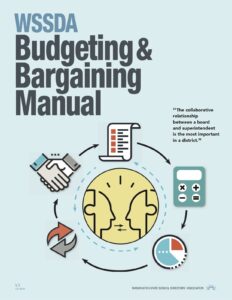
A school board’s role is not to negotiate employment contracts and salaries other than the superintendent’s. Instead, their focus is generally on:
- student achievement
- sound fiscal oversight
- community engagement
- policies and governance
- strategic vision, mission and goals
- employing a superintendent to manage the district
But when negotiations with local labor associations turn difficult, board members are often drawn into the fray. Even so, board members who involve themselves in bargaining are acting outside of their governance role.
There is no magic formula to prevent a board from finding themselves in that position, but there are some strategies that can help before, during and after the negotiation stage. WSSDA’s Budgeting & Bargaining Manual is designed to support school directors at each stage.
Table of Contents
Central to successful collective bargaining is to see it less as a single event that happens annually or every few years, but rather as one part of a year-round cycle. This manual provides a detailed description of the cycle and what boards can do to lead in a way that is positive, honest, and in compliance with the law.
Here’s what you’ll find in the manual:
- Roles & Responsibilities of School Directors
- Budgeting & Bargaining Cycle
- Communication Plan
- Year-Round Cycle
- Plan
- Budget
- Calibrate
- Negotiate
- Unite
- Challenging Negotiations & Strikes
- Challenging Negotiations
- Pre-Strike
- Strikes
- Board Meetings & Legal Considerations
- Appendices
- Sample Labor Association Bargaining Strategies
- Sample Labor Association Bargaining Messaging In District
- Sample School District Webpage Messaging
- Terminology